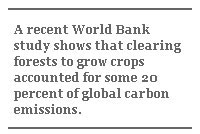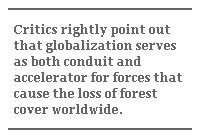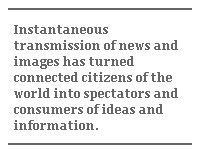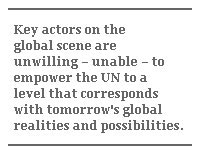The Double Edge of Globalization
The Double Edge of Globalization

grow more crops for export is certainly behind some deforestation
NEW HAVEN: An electrician who came to my house to repair some lights asked what I did at Yale. He was shocked that I worked at the university’s Center for the Study of Globalization. “Isn’t it true that globalization destroys the rainforest?” he asked, explaining his surprise. Although I do not work for globalization, his concern is valid and shared by many who take to the street protesting globalization.
That charge holds if, by globalization, one simply means expanded international trade. The other charge, that multinational companies wreak havoc on the global environment by moving operations to countries where environmental regulations are weak or nonexistent, is a little more difficult to prove. A recent World Bank study shows that clearing forests to grow crops accounted for some 20 percent of global carbon emissions.

But the bank has found little evidence that companies chose to invest in such countries to shirk pollution-abatement costs in rich countries. Instead, the most important factor in determining the amount of investment was the size of the local market. It has also been found that within a given industry, foreign-operated plants tended to pollute less than local peers
The World Trade Organization, and by extension globalization, also stands accused of destroying the global environment. Expanding trade driven by globalization has brought about increased fishing, destruction of forestland, and the spread of polluting industries to the developing world. In a November 2005 report, the UN Food and Agricultural Organization reported that each year about 18 million acres of the world's forests – an area the size of Panama or Sierra Leone – are lost due to deforestation.
Serious critics of globalization acknowledge that deforestation cannot be laid at the door of globalization alone. But they rightly point out that globalization does serve as both a conduit and an accelerator for many of the forces that cause the loss of forest cover worldwide.
By encouraging trade, globalization encourages consumption, which leads to more logging worldwide. Governance at both local and global levels has failed to promote conservation and reforestation.

China is a case in point. A major beneficiary of globalization as the world's factory, it increasingly turns to other countries to meet its burgeoning demand for food. That is good news for Brazilian farmers who want to cash in on China’s growing demand for soybeans: The environmental organization Greenpeace estimates that more than 2.5 million acres of tropical forest have been cleared in recent years to plant soybeans. Greenpeace also claims that there is "a 7,000 km chain that starts with the clearing of virgin forest by farmers and leads directly to chicken nuggets being sold in British and European fast food restaurants" and labels the British import of soy animal feed from Brazil as tantamount to "forest crime," according to an article in the Guardian.
China's blazing economic growth, supplying cheap products to the world, has other costs, too. Accelerated burning of coal and use of chemicals to fuel the export machine pollute not only China's air and water but the world’s environment as well. A 2004 study found that the jet stream dispersed chemicals like mercury, spewed by factories in China, to locations thousands of miles away. A researcher traced a plume of dirty air from Asia to New England, where analysis of collected samples revealed the chemicals had originated in China, reported the Wall Street Journal in 2004.
A major change between past globalization and its present state is the visibility of the connections. In today's hyperconnected world, the backlash can rise and proliferate faster than in the past.
The instantaneous transmission of news and images has turned the thoroughly connected and even marginally connected citizens of the world into spectators and consumers of ideas and information. Images of natural disaster and human suffering elicit instinctive human sympathy and support in the wake of a tsunami or an earthquake.
The threat of global warming, a matter of increasing concern, increasingly claims front-page attention in newspapers around the globe. A New Haven electrician is globally aware, worrying about destruction of the Amazon rainforest and how that might impact the world’s climate.

Global warming has the potential to shrink the global economy by 20 percent and to cause economic and social disruption on a par with World Wars I and II and the Great Depression, according to a report prepared by economist Nicholas Stern. The connection between carbon-emitting economic growth and increasing trade and industrialization brought by globalization is unmistakable.
As world trade grows and millions of factories join the global supply chain, as mines are exploited and timber is felled to meet rising consumer demands, increased pollution is often the price. Pollution hits the originating country first, contaminating its soil and water, but soon is absorbed in the atmosphere, where it becomes a global problem – poisoning the air and bringing acid rain to other parts of the world.
The millions of migrants who might be forced out of their homes because of flooding caused by global warming are still in the realm of speculation. Surprisingly, despite the availability of energy-efficient technologies and know-how, little use is made of them. The world seems paralyzed about how to face the threat of global warming.
The world's top emitter of greenhouse gases, the United States, has refused to sign the Kyoto Protocol, and the nations that have signed it have been inconsistent with its implementation, making only perfunctory attempts to grapple with the challenge of global warming.
Yet there is dramatic evidence that with the commitment of nations and effective global governance, it is possible to avert dangerous trends. Thanks to concerted action taken in combating ozone depletion through the Montreal Protocol, the ozone hole has shrunk. There are even signs that as a result of economic growth, urbanization and enlightened public policies born of global awareness, more nations are reversing the longstanding trend toward destruction of their forests.

Life in every country today is so inextricably intertwined with the rest of the world that failure to appreciate this interdependence and its long-term effects could risk the world's drifting toward a major crisis. The international system is lacking institutional capacity to address the issues we face. The current ineffective state of the United Nations in tackling some of the major humanitarian disasters illustrates the dilemma. Blaming the UN makes little sense, however.
Rather, the root cause is the unwillingness – or inability – of key actors on the global scene and their constituencies to empower the UN to a level that corresponds with tomorrow's global realities and possibilities. A multitude of non-governmental organizations worldwide – the new preachers – have performed valuable services in addressing many problems raised by interconnectedness. But nothing can replace the power of sovereign governments working in concert to tackle global challenges.
Although no one is in charge of globalization, history shows that political power can channel or obstruct the multitude of currents that feed globalization, and lead to a change in course.
Nayan Chanda is director of publications and editor of YaleGlobal Online. This article is adapted from his book “Bound Together: How Traders, Preachers, Adventurers, and Warriors Shaped Globalization,” published by Yale University Press in May 2007. Click here for an excerpt of the book.